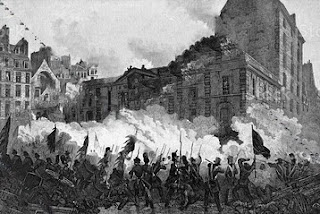How important is the character of
Tony Lumpkin in the drama?
The play
opens with Mr. and Mrs. Hardcastle, discussing the son of Mrs. Hardcastle’s
first marriage, Tony Lumpkin, who is a wild young man full of high spirit. In
the first appearance, Tony is seen as the spoiled “dear boy” of his mother; an
ungracious, disrespectful bumpkin, full of high spirit and roistering in an
ale-house. There, however, he is a popular figure, singing a song, standing
drinks and looking forward to his coming of age, when he will inherit an
income. He resents his stepfather and sizes the opportunity to play an impish
trick upon him and the bucks from London by directing them to their expected
Mr. Hardcastle’s house as an inn. Though he is intelligent, he is intelligent
enough to tell them that the landlord “wants to be thought a gentleman” and
“he’ll be for giving you his company” to ensure that the young men will simply think
Mr. Hardcastle is an eccentric kind of innkeeper.
With the
progress of the play Tony changes, and his resentment turns against his mother;
indeed, he would seem to be freeing himself from her domination. He is quite
prepared to take the part of the lovers against her; he is eager to give them
the jewels she has hoarded for him. Her machinations are wrong; so his
conspiring against her seems condonable. He does not want to be married off to
Constance; he fancies Bet Bouncer and he has seen his chance of freedom:
“If I’m a
man, let me have my fortin. Ecod! I’ll not be made a fool of no longer”.
He is also
loyal to his Bet Bouncer who, though she never appears on stage, is
unforgettably described by Tony:
Ah! Could you but see Bet Bouncer of these parts, you might then talk of beauty. Ecod, she has two eyes as black as sloes, and cheeks as broad and red as a pulpit cushion.
Though
exposed at the end, he regards his mother’s keeping back his inheritance as
unreasonable. He secretly gathers money from the “drawer in mother’s bureau” to
spend at the alehouse with a clear conscience. “An honest man may rob himself
of his own at any time”.
Though Tony is apparently an “awkward
booby”, he has stage-managed in suggesting to his mother that she should
pretend the jewels are “missing” when telling Constance and he will support her.
But underneath that he has stolen jewels himself and given to Hastings revels
skill beneath an apparently blockheaded attitude:
That I can bear witness to. They are missing, and not to be found; I’ll take my oath on’t
When Mrs.
Hardcastle has really discovered the jewels “missing” his treatment of her
distress shows hid cleverness even more and his repetition of “I can bear
witness to that” intensifies the ironic complexity of this highly comic scene.
He gains the audience’s approval through his liveliness and exuberance. His
sulkiness about Constance in act II and his over-active act in helping Hastings
in act III and enduring mother’s denouncement is part of the realism of his
character:
Never you mind her resentment, leave me to manage that. I don’t value her resentment the bounce of a cracker.
Tony can carry off the débâcles
without losing heart. When Constance’s elopement by Hastings is revealed to
Mrs. Hardcastle, she is furious. She has given Constance an order for the journey
to aunt Padigree’s and Constance says: “so now I’m completely ruined”, he
comically remarks, with very comic effect, “Ay, that’s a sure thing”. With equal
detachment he remarks to Hastings, “Here’s another” and to Marlow, “we shall
have old Bedlam broke loose presently”. And then he promises to alter things
within two hours. Tony starts the journey as a couch man of Constance and Mrs.
Hardcastle. At the back of the garden, Hastings is joined by Tony, who tells him
he has brought the coach back by a circuitous route and lodged it in the horse
pond at the bottom of the garden. He enjoys his invented situations and
pretends that he has brought her to the notorious Crackskull Common. When he
sees his stepfather approaching, his plan is wasted. And when the deception is
revealed and he is berated by both Mr. and Mrs. Hardcastle, he justifies
himself:
Ecod, mother, all the parish says you have spoiled me and so you may take the fruits on’t.
But he also faces resentment from others for his
exploitive nature as “a mere boy, an idiot whose ignorance and age are a
protection”, “a poor contemptible booby” and “cunning
and malice enough to make himself merry with all our embarrassments”. Finally,
Mr. Hardcastle exposes that Tony has been of age for three months and he formally
refuses Constance again.
In favour of Tony, Mr. Robert Hearing
says, ‘The title is somewhat misleading, for the central character is not Miss
Hardcastle, but Tony Lumpkin. Though the main incident is her “stooping”… this
could not have occurred, even … had not Tony first misdirected the travellers”.
The whole plot turns on his pranks and he is the pillar of the whole structure.
Tony’s character is sufficiently
complex for an extra dimension, i.e. he is more than a country booby, that he
is more than a type, he is an individual, essentially generous, intrinsically
gay. But he shares in the ignominy to which the jesters are doomed in real
life, but still, he illuminates himself with his resplendence.




